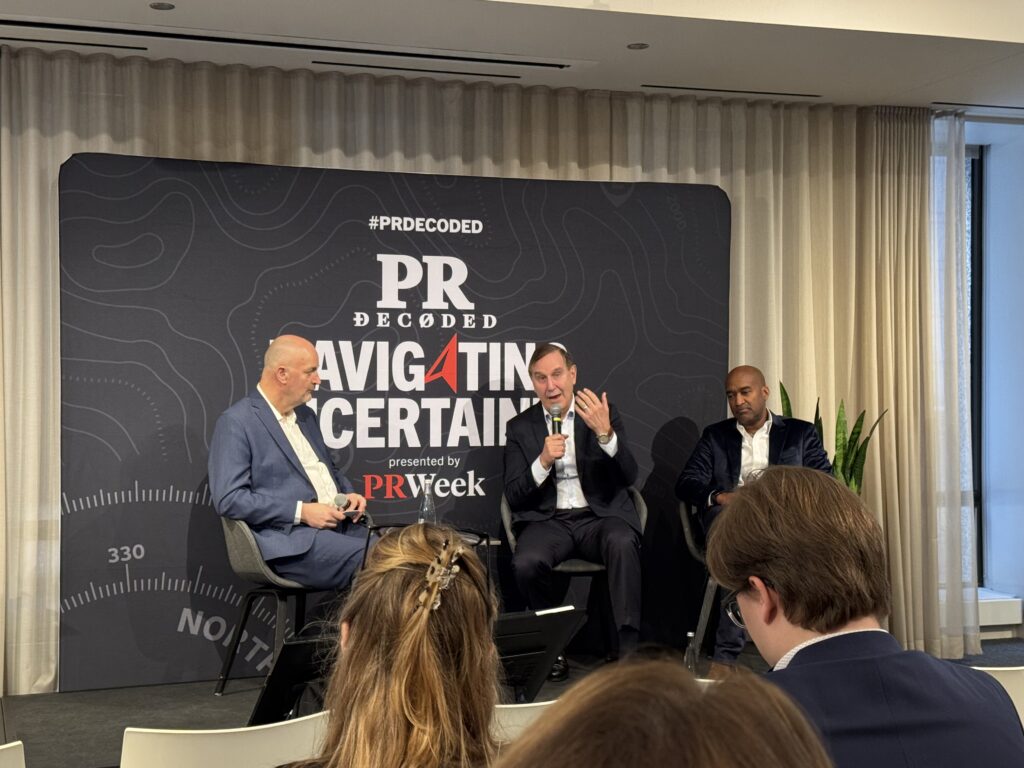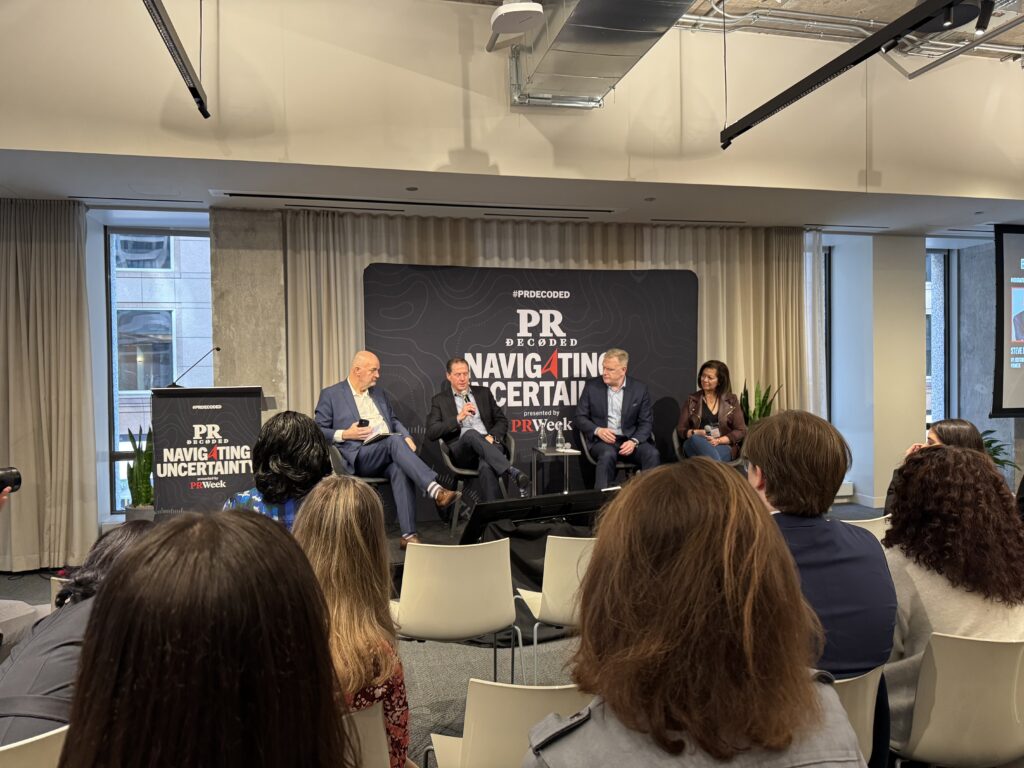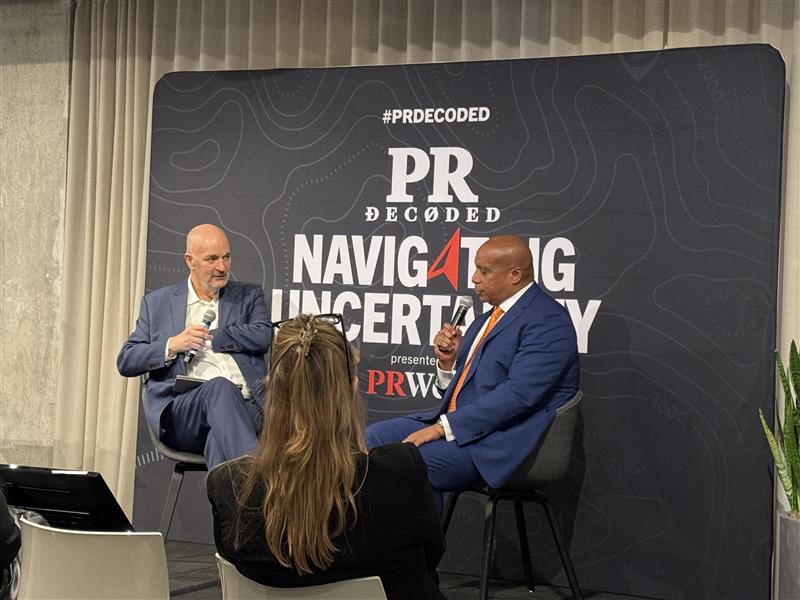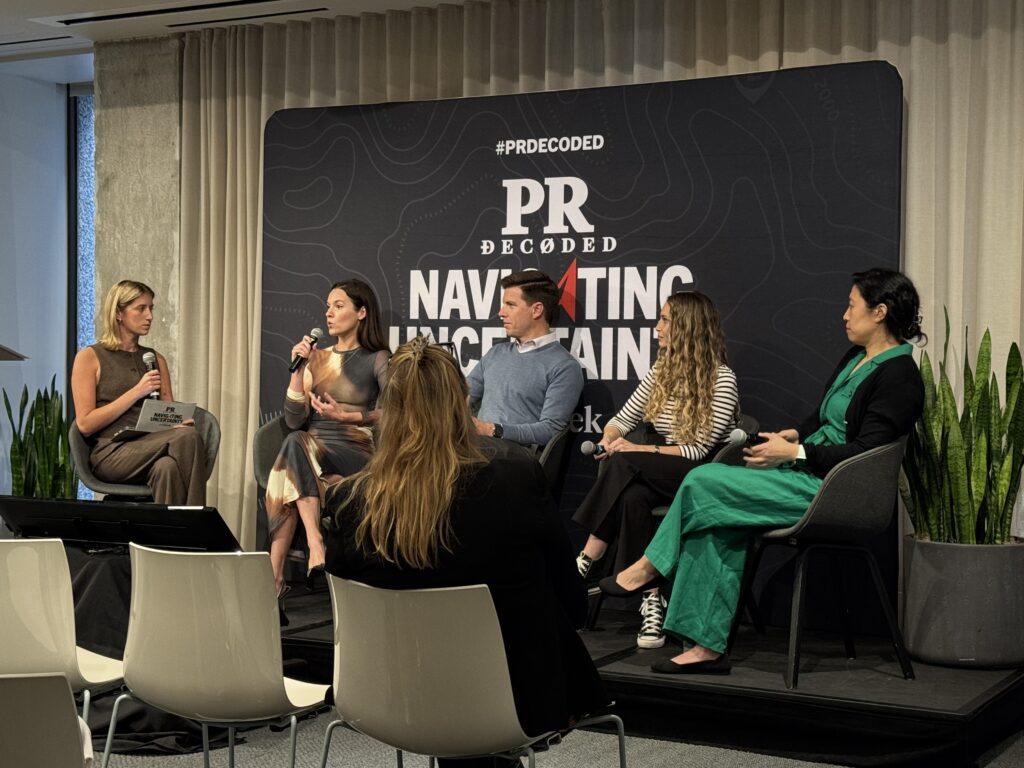The PRDecoded 2025 conference in Chicago brought together the industry’s sharpest minds to explore one urgent theme: how communicators can navigate uncertainty in an era of accelerating change.
Below is a summary of the sessions I attended and a breakdown of the messages I subsequently took away from the event.
Across sessions led by agency leaders, brand executives, and researchers, I found one message expressly clear: the rules are being rewritten, and PR is better positioned than ever to lead.
1. PR’s Defining Moment Has Arrived
The opening “State of the PR Nation” conversation between Richard Edelman of Edelman and Chris Foster of Omnicom PR Group set an assertive tone.
Edelman made an impassioned call for communicators to seize what he called “PR’smoment”. By which he was saying the rise of earned influence in AI-driven search. With Large Language Models (LLMs) pulling heavily from earned and organic media, PR has a measurable impact on reputation and revenue. Reputation driven from earned media is now the lead.
Foster echoed this sentiment, emphasizing that communicators must understand business fundamentals as deeply as they understand storytelling. “We own the story, and the story is the strategy,” he said, urging PR pros to lean into technology, not fear it.
Both agreed: this is not a time for timidity. It’s a time for PR to demonstrate its elasticity, its fluency in technology, and its ability to connect earned narratives directly to business outcomes.

2. Rebuilding Trust in a Skeptical World
In a panel on: Building Brand Trust in an Era of Skepticism, leaders from Feeding America, Conagra, and Allison shared a stark reality: trust is the most valuable — and fragile — currency brands hold.
Monica McCafferty of Feeding America argued that rebuilding it starts with authenticity. Conagra’s Jon Harris underscored the need to earn and sustain stakeholder trust consistently, noting that in an age of transparency, words alone no longer suffice.
The takeaway? As optimism fades in Western democracies, communicators must play a central role in restoring belief not through messaging spin, but through actions that align with brand purpose.

3. AI Is Reshaping the Communications Ecosystem
Several sessions reinforced that artificial intelligence is the next evolution of our craft, not the enemy
From Glenn Frates of PR Newswire calling for “information releases” structured to serve both human and machine readers, to Eileen O’Neill of Culligan reminding brands to “use data in smart ways,” the core message seemed to be: AI changes not what we say, but how we deliver and contextualize it.
Perhaps most eye-opening was Rob Bernstein of Ketchum’s presentation on Harnessing the Power of Search in the Era of Generative AI. He highlighted that GenAI represents the fastest technology adoption in history — 100 million users in two months — and it’s already redefining discovery.
In this “no-click search” world, GenAI doesn’t send people to your website; it becomes your website. Bernstein called it “the most powerful influencer of reputation,” urging communicators to analyze which stories are feeding algorithms and to optimize for visibility and sentiment.
His advice: Analyze → Interpret → Optimize. Because if you don’t answer questions about your brand, AI will, though you might not like the results.
4. Data Is the New Language of Reputation
In the Guardians of Reputation session, ADM’s Brett Lutz and Carma’s Orla Graham discussed how data is reframing reputation management.
Younger audiences, Graham noted, are deeply influenced by brand values. According to her, they don’t just buy products; they buy alignment. Lutz shared how ADM’s communications team uses data to make rapid strategic pivots, from reacting to political comments affecting corn prices to tracking how GenAI portrays their brand in search.
Similarly, in the session Reputation Is Currency, speakers described how their teams are investing in analytics and predictive modeling to quantify the business impact of communications,, underscoring how insights infrastructure now directly supports C-suite decision-making.
5. The Evolving Role of the CEO as Chief Communicator
The CEO as Lead Communicator panel and Kevin Warren’s keynote, Leadership and Aiming High, underscored the modern CEO’s role as a communicator first, operator second.
Warren, President & CEO of the Chicago Bears, shared how his decision-making philosophy, “player safety first” during the Big Ten’s pandemic-era challenges, stemmed from values-based clarity. Similarly, Monosol’s leaders spoke about agility and proactive signal detection as key to navigating crises like the “Tide Pod Challenge.”
The throughline: CEOs must not only embody transparency but also rely on communications teams who can sense emerging risks before they surface.

6. Strategic Responsiveness Is the New Crisis Playbook
In Cultural Flashpoints and the C-Suite, BMO’s Laura Micheli and Northwestern’s Jonathan Copulsky reframed crisis management as an ongoing cycle of intelligence and adaptation.
Copulsky drew parallels between brand resilience and military counterinsurgency strategy, emphasizing prediction, learning, and iteration rather than one-off crisis containment. Micheli shared how BMO’s culturally attuned campaigns, like #LoudBudgeting, turned potential financial anxiety into empowerment and relatability.
In summary: agility and foresight are foundational.
7. Influencers and Audiences Are Co-Creators of Trust
Finally, the Influencer Marketing Is the New Media session challenged the traditional view of influence.
GM’s Jessica Carmona and Burson’s Vikki Chowney argued that today’s most powerful influencers aren’t always celebrities.They’re the people who understand content and audience psychology. Chowney emphasized the importance of shared values and co-creation, while Reddit’s Adam Seligson noted that each platform requires a tailored, value-driven approach.
Basically, audiences can tell when brands “show up” authentically and they reward it.

PR Must Lead Through Change
PRDecoded 2025 made one thing clear: uncertainty is not the enemy, but complacency sure is.
Communicators are the guardians of reputation, the architects of narrative truth, and now, the stewards of how AI perceives our brands. The future belongs to those who blend creativity with data, courage with curiosity, and empathy with precision, and as partners to communicators, we’re ready to help.
This is PR’s moment to lead — not by reacting to the world’s uncertainty, but by shaping what comes next.
By Jim Key, VP of Enterprise Solutions, PublicRelay